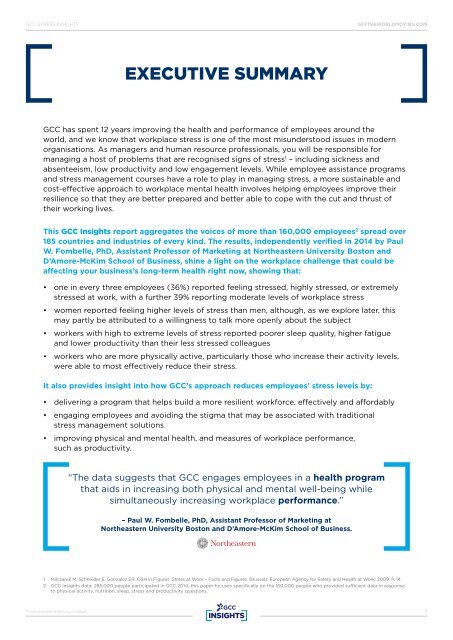GCC-Insights-Stress-Report
GCC-Insights-Stress-Report
GCC-Insights-Stress-Report
Create successful ePaper yourself
Turn your PDF publications into a flip-book with our unique Google optimized e-Paper software.
<strong>GCC</strong> STRESS INSIGHTS<br />
GETTHEWORLDMOVING.COM<br />
EXECUTIVE SUMMARY<br />
<strong>GCC</strong> has spent 12 years improving the health and performance of employees around the<br />
world, and we know that workplace stress is one of the most misunderstood issues in modern<br />
organisations. As managers and human resource professionals, you will be responsible for<br />
managing a host of problems that are recognised signs of stress 1 – including sickness and<br />
absenteeism, low productivity and low engagement levels. While employee assistance programs<br />
and stress management courses have a role to play in managing stress, a more sustainable and<br />
cost-effective approach to workplace mental health involves helping employees improve their<br />
resilience so that they are better prepared and better able to cope with the cut and thrust of<br />
their working lives.<br />
This <strong>GCC</strong> <strong>Insights</strong> report aggregates the voices of more than 160,000 employees 2 spread over<br />
185 countries and industries of every kind. The results, independently verified in 2014 by Paul<br />
W. Fombelle, PhD, Assistant Professor of Marketing at Northeastern University Boston and<br />
D’Amore-McKim School of Business, shine a light on the workplace challenge that could be<br />
affecting your business’s long-term health right now, showing that:<br />
• one in every three employees (36%) reported feeling stressed, highly stressed, or extremely<br />
stressed at work, with a further 39% reporting moderate levels of workplace stress<br />
• women reported feeling higher levels of stress than men, although, as we explore later, this<br />
may partly be attributed to a willingness to talk more openly about the subject<br />
• workers with high to extreme levels of stress reported poorer sleep quality, higher fatigue<br />
and lower productivity than their less stressed colleagues<br />
• workers who are more physically active, particularly those who increase their activity levels,<br />
were able to most effectively reduce their stress.<br />
It also provides insight into how <strong>GCC</strong>’s approach reduces employees’ stress levels by:<br />
• delivering a program that helps build a more resilient workforce, effectively and affordably<br />
• engaging employees and avoiding the stigma that may be associated with traditional<br />
stress management solutions<br />
• improving physical and mental health, and measures of workplace performance,<br />
such as productivity.<br />
“The data suggests that <strong>GCC</strong> engages employees in a health program<br />
that aids in increasing both physical and mental well-being while<br />
simultaneously increasing workplace performance.”<br />
– Paul W. Fombelle, PhD, Assistant Professor of Marketing at<br />
Northeastern University Boston and D’Amore-McKim School of Business.<br />
1. Milczarek M, Schneider E, Gonzalez ER. OSH in Figures: <strong>Stress</strong> at Work – Facts and Figures. Brussels: European Agency for Safety and Health at Work; 2009. P. 14.<br />
2. <strong>GCC</strong> <strong>Insights</strong> data; 285,000 people participated in <strong>GCC</strong> 2014, this paper focuses specifically on the 160,000 people who provided sufficient data in response<br />
to physical activity, nutrition, sleep, stress and productivity questions.<br />
© Get the World Moving Limited<br />
1


